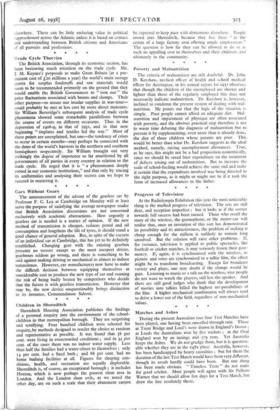Trade Cycle Thecries The British Association, through its economic section,
has been bestowing much attention on the trade cycle. Mr. J. M. Keynes's proposals to make Great Britain (at a per- manent cost of £20 millions a year) the world's main storage centre for surplus foodstuffs and raw materials would seem to be recommended primarily on the ground that they would enable the British Government to " iron out " the price fluctuations associated with booms and slumps. Their other purpose—to assure our insular supplies in war-time- could probably be met at less cost by more direct measures. Sir William Beveridge's subsequent analysis of trade cycle phenomena showed some remarkable parallelisms between the course of events on different occasions. Thus in the depression of 19o8-9, in that of 1931, and in that now beginning " tinplates and textiles led the way." Most of these points are unexplained, but one—the tendency of crises to occur in certain months—may perhaps be connected with the dates of the world's harvests in the northern and southern hemispheres respectively. Sir William brought out very strikingly the degree of impotence so far manifested by all governments of all parties in every country in relation to the trade cycle. He urged that it is " a phenomenon deeply rooted in our economic institutions," and that only by tracing its uniformities and analysing their secrets can we hope to succeed in mastering it.
* * * *


































 Previous page
Previous page